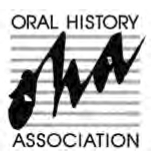 Oral History Association Annual Meeting
Oral History Association Annual Meeting
Saturday, October 30, 2010
Report by Wesley Chenault and Ian Lekus
The Oral History Association held its 2010 annual meeting October 27-31, in Atlanta, Georgia. The conference theme, “Times of Crisis, Times of Change: Human Stories on the Edge of Transformation,” brought focus to practices of collecting and sharing human stories and to the ways in which oral histories help communities and societies make sense of turning points and critical shifts. It was a fitting theme for queer histories and stories.
Through the work of program committee co-chairs David A. Reichard and Tomás F. Summers Sandoval and the local arrangements committee, LGBT oral histories and projects were visible throughout the conference. In addition to various sessions, the program included the plenary, “Reclaiming Our Stories: A Conversation With Organizers of LGBT Community-Based Oral History Projects.” Moderated by Ian Lekus (Harvard University; Chair of the Committee on LGBT History), the panel included Tracy Baim (Chicago Gay History), Wesley Chenault (Auburn Avenue Research Library; Committee on LGBT History Governing Board member), Dave Hayward (Touching Up Our Roots, Inc.), and Glenne McElhinney (Impact Stories Oral History Project).
In his opening, Lekus greeted the audience, estimated at 75 attendees, and provided a brief introduction to the plenary topic and its format. Panelists followed with descriptions of themselves and of the oral history projects in which they are involved. After that, Lekus posed a series of questions crafted to address a range of issues, from funding to community support to divisions within queer communities. He also invited attendees to participate in a dialogue about these issues and more.
For his first question, Lekus asked the panel what makes LGBTQ oral histories unique. Numerous panelists mentioned privacy concerns, including outing people who have passed and outing an individual’s HIV status. Baim talked about an oral history participant who was planning travel to the United Arab Emirates and expressed concern about possible implications deriving from the transcript being made publicly available. Panelists also discussed generational differences, especially with LGBTQ elders. McElhinney shared her experiences working with people who came out in the 1940s and 1950s. Some participants felt their stories weren’t of interest to anyone, no one cares. Others required months of building trust before they would allow an interview. Baim, Chenault, and Hayward also discussed the role of trust between interviewers and interviewees.
The panelists offered other examples of issues specific to LGBTQ oral histories. Chenault talked about loss—community memory, loss from HIV/AIDS, or overall generational loss. Hayward noted how the fears of being “outed” created restrictions on the use of video oral history on TV and anxieties over the memories of even those LGBTQ persons long deceased. Baim talked about handling interviews with couples where one partner is closeted. Audience members then posed questions about notions of generational difference and oral history methods. There was some debate among the panel and the audience around a few questions, including: What’s intergenerational miscommunication? What’s inadequate research? And what’s cultural change? Lekus moderated the exchange, which was followed by a question about the impact of oral histories on narrators.
As the plenary drew to an end, the panel addressed the politics of collecting LGBTQ materials. Chenault gave examples of Atlanta-based materials that went to repositories outside of the state at a time when few local institutions accepted LGBTQ collections, a situation that has changed. He also gave an example of the politics of race, donor relations, and institutional reputations. Building on this point, McElhinney emphasized the importance of trust between queer communities and collecting institutions. After that, an audience member posed a final question about challenges specific to bisexual and transgender oral histories. With little time left, Baim talked about her experiences working with trans narrators, some of whom after transitioning and being activists later intentionally disappeared themselves from the community. After Lekus announced the close of the plenary and thanked the audience, discussion continued in small groups—a good signal that panelists and attendees alike were truly engaged.






Pingback: The Committee on Lesbian, Gay, Bisexual, and Transgender History | Blog | Reports from AHA and Oral History Association meetings